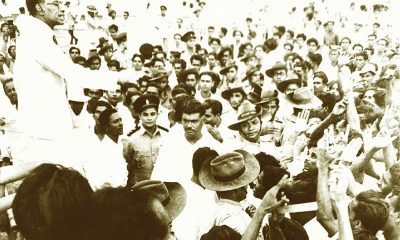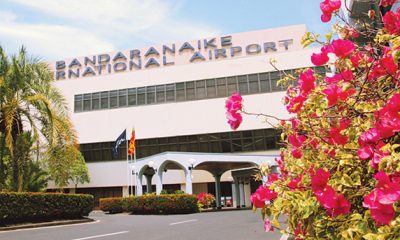News
CSCD takes up battle cry for elections
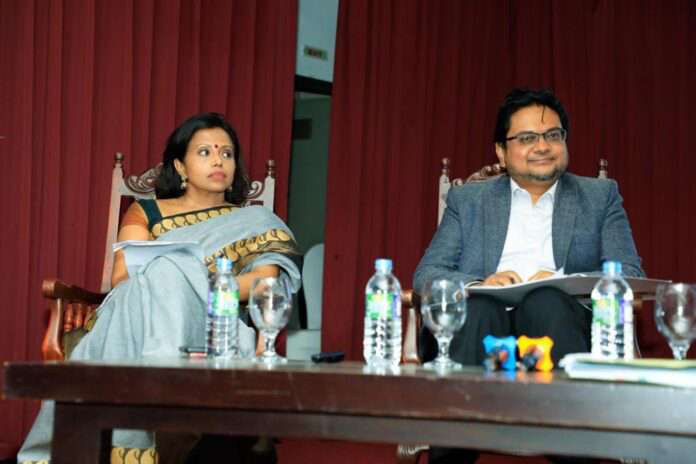
The Civil Society Collective for Democracy (CSCD) says that recent statements from the President, the Speaker and some other MPs who attempt to undermine judicial independence are deeply troubling.
CSCD says that the 21st Amendment to the Constitution has re-established the independent commissions, but the recent acts of intimidation targeting members of the Election Commission and the Public Utilities Commission are examples of the disabling environment that has been created for these institutions. “At the heart of the matter, citizens’ sovereign right to vote has been infringed upon using financial constraints as an excuse, an explanation lacking credibility. Currently Sri Lankans have no elected representatives at local and provincial levels and these institutions are governed by unelected officials controlled by a centralised executive. This if not addressed soon may call into question the definition of Sri Lanka as a democracy,” it said in a statement issued to the media following a meeting held at the Sri Lanka Foundation Institute (SLFI) in Colombo on Tuesday (29).
CSCD is a coalition of concerned citizens and organizations including civil society organizations, professionals, academics, trade unions, youth leaders, activists, media personnel, religious figures, and other influencers, convened the meeting to deliver a crucial wake-up call to the nation’s political leaders. The urgent call is to halt state repression and safeguard the democratic rights of the people, in order to ensure actual and equitable economic recovery.
The CSCD expresses deep concern over the rapid shrinking of democratic space within the country, with Constitutionally guaranteed rights and freedoms such as the freedom of expression, right to information, right to dissent, right to protest, freedom of association and the right to franchise being snatched away, leaving citizens often powerless. This surge in silencing voices and the targeting and harassment of those who question the authorities, have created a chilling effect among the people, leading to self-censorship.
Furthermore, the rulers have been abusing the International Covenant on Civil and Political Rights (ICCPR) and the contentious Prevention of Terrorism Act (PTA) to target political opponents, civil society activists, and journalists, contrary to international commitments, including those made at the United Nations Human Rights Council (UNHRC). The recent attempts to introduce extremely oppressive versions of laws such as the Anti-Terrorism Act, Broadcasting Commission Act and the NGO Act are examples of Government’s attempt to threaten and control democratic space.
To uplift Sri Lanka from the economic crisis, it is essential to address its root causes – poor governance, lack of inclusivity and corruption. Unless these fundamental issues are addressed, Sri Lanka will continue to be considered as a complex investment context that will discourage investors and thus hamper economic recovery.
Ensuring transparency and accountability in governance is essential to prevent corruption and to ensure good governance. For people to be able to hold their representatives and the stewards of public resources accountable, they need to be able to exercise their democratic rights and freedoms. A truly democratic system would enable citizens to elect and vote out their representatives regularly, be involved and informed of all Government’s decisions that affect their lives, be able to dissent and make their voices heard in protest and be able to form collectives and exert pressure on the authorities to change course when necessary.
A government that acts in the best interest of the people and is genuine in its effort to uplift the economy will not hesitate to expose themselves to public scrutiny.
In line with these principles, the CSCD calls upon the political establishment to take immediate steps to uphold and defend the foundational principles of democracy by:
– Ensuring that free and fair elections essential for inclusion are held on time, starting immediately with the Local Government and Provincial Council Elections.
– Uphold the fundamental rights of citizens, including freedom of expression and association and right to information.
– Protect civic space and create an enabling environment for civil society activism.
– Ensure citizen consultation and participation in steering economic recovery.
– Govern with transparency and accountability, ensuring full public scrutiny.
– Empower the independent commissions to fulfill their roles effectively.
– Take a genuine effort to implement essential anti-corruption reforms.
-Take action to prosecute past and present acts of corruption to end the climate of impunity,” the CSCD said.
Latest News
Landslide RED warnings issued to the Divisional Secretaries Divisions of Ududumbara, Nildadndahinna and Walapane
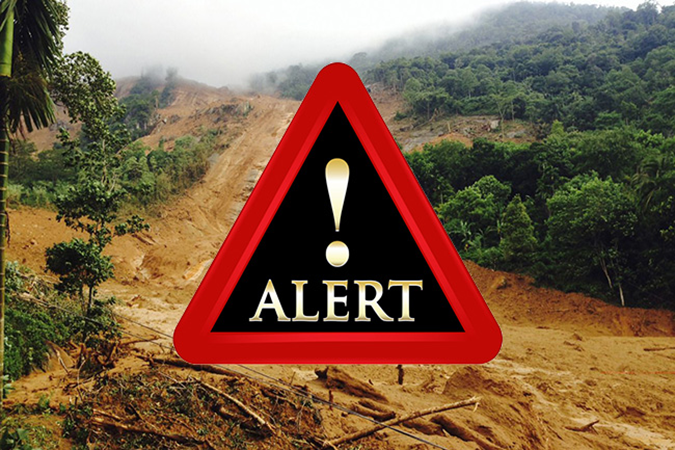
The landslide early warning center of the National Building Research Organisation [NBRO] has issued RED warnings to the districts of Kandy and Nuwara Eliya for the next 24 hours effective from 0900 hrs today [09th January].
Accordingly,
LEVEL III RED landslide early warnings have been issued to the Divisional Secretaries Divisions and surrounding areas of Ududumbara in the Kandy district, and Nildandahinna and Walapane in the Nuwara Eliya district.
LEVEL II AMBER landslide early warnings have been issued to the Divisional Secretaries Divisions and surrounding areas of Wilgamuwa in the Matale district, and Mathurata and Hanguranketha in the Nuwara Eliya district.
LEVEL I YELLOW landslide early warnings have been issued to the Divisional Secretaries Divisions and surrounding areas of Uva Paranagama, Welimada, Kandaketiya, Badulla, Meegahakiwula, Hali_Ela, Passara and Lunugala in the Badulla district, Minipe in the Kandy district, Ambanganga Korale, Ukuwela, Rattota, Naula and Laggala_Pallegama in the Matale district, and Nuwara Eliya in the Nuwara Eliya district.
Latest News
A Policy is being formulated to ensure Child Protection in the use of Technology — Prime Minister

Prime Minister Dr. Harini Amarasuriya stated that a policy is currently being formulated to ensure child protection in the use of technology.
The Prime Minister made this statement on Thursday (08) in Kandy while briefing the Most Venerable Mahanayake Theros of the Asgiriya and Malwathu Chapters on the issue that has arisen regarding the Grade 6 English module. Thereafter, printed copies of all modules were presented to the Mahanayake Theros.
Earlier on Thursday (08), the Prime Minister visited the Malwathu Viharaya in Kandy and met the Most Venerable Thibbatuwawe Sri Siddhartha Sumangala Nayaka Thero, the Mahanayake of the Malwathu Chapter, where she explained the error that had occurred in the first print run of the English module for Grade 6 .
The Mahanayake Theros emphasized that education is a sensitive subject and that such matters should be handled with greater sensitivity and proper oversight. They further advised that a formal investigation should be conducted and that education reforms should be carried forward in a systematic manner.
Subsequently, the Prime Minister visited the Asgiriya Maha Viharaya and met the Most Venerable Warakagoda Sri Gnanarathana Mahanayaka Thero of the Asgiriya Chapter, where she clarified the error related to the English module.
The Mahanayake Thero noted that education reforms are a timely necessity and should be implemented with due oversight and careful review and also pointed out that there are broader issues in Sri Lanka regarding the use of technology, which are evident in the manner in which modern tools such as AI technologies are being used on social media.
Clarifying the issue Prime Minister Dr. Harini Amarasuriya further stated,
“We have appointed a committee to look into this issue, and based on the recommendations of the National Institute of Education (NIE), steps were taken to remove the relevant lesson. In addition, all printed copies of the relevant module have been stamped, and no module has been distributed to schoolchildren. A formal investigation into this matter has been initiated by the Ministry, and a complaint has also been lodged with the Criminal Investigation Department.
At the same time, we are in the process of formulating a policy on child protection in the use of technology”.
Thereafter, addressing the media and responding to the’ questions raised by journalists, the Prime Minister stated:
“The Opposition is attempting to use this national task for their own political advantage. However, many in society have expressed their views on the issues that have arisen in a positive manner, with the objective of identifying and correcting mistakes. The government has decided to move forward with education reforms by recognizing the error that have occurred and rectifying them. We will take the no-confidence motion brought by the Opposition as an opportunity to further advance dialogue on education reforms”
The occasion was graced by the Most Venerable Anunayaka Thero of the Asgiriya Chapter, Venerable Narampanawe Ananda Nayaka Thero; Deputy Registrar of the Asgiriya Chapter, Venerable Muruddeniye Dhammarakkhita Thero; Deputy Registrar of the Malwathu Chapter, Venerable Mahawela Rathanapala Thero; Members of Parliament Thushari Jayasinghe and Thanura Dissanayake; Mayor of Kandy Chandrasiri Wijenayake; Secretary to the Ministry of Education Nalaka Kaluwewa; and Secretary to the Ceylon Teachers’ Union in Central Province D. D. Wimalaweera.
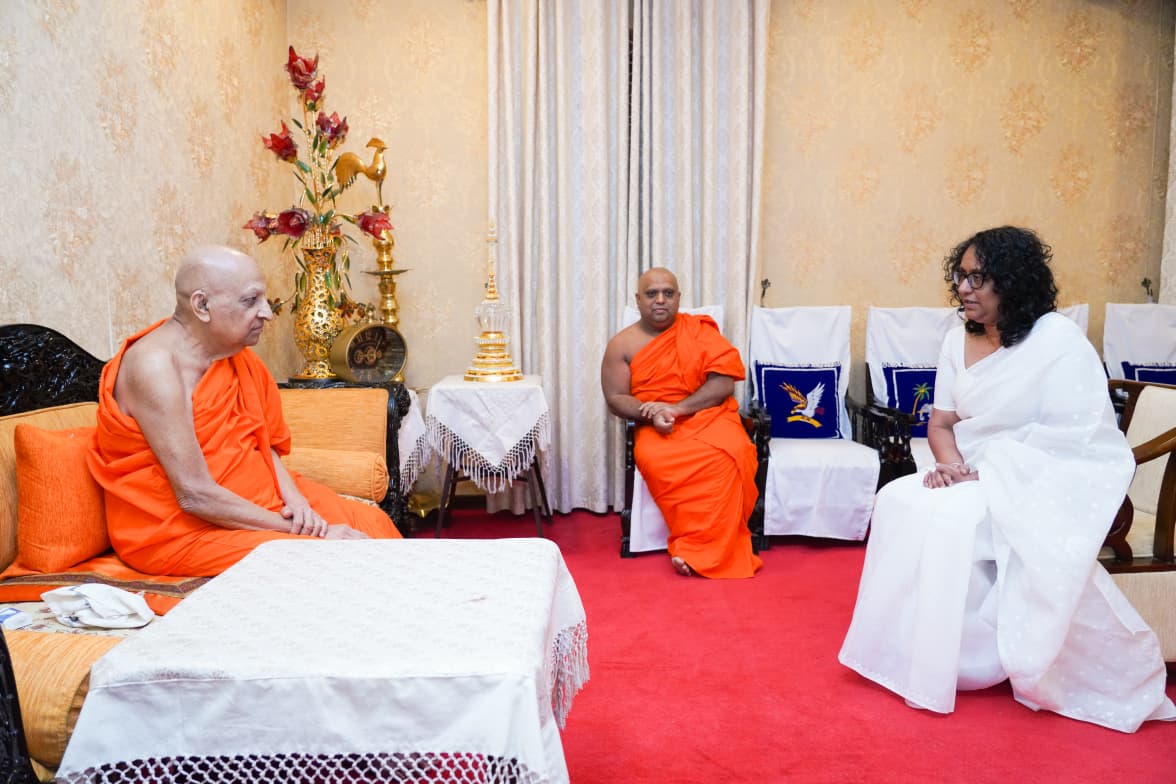
[Prime Minister’s Media Division]
Latest News
The deep depression to the South-east of Sri Lanka is likely to intensify in to a cyclonic storm during the next 24 hours

A RED warning for a deep depression to the South-east of Sri Lanka has been issued at 01.00 a.m. on 09 January 2026 for the period until 01.00 a.m. 10 January 2026 by the Natural Hazards Early Warning Centre, of the Department of Meteorology.
The deep depression in the Bay of Bengal to the southeast of Sri Lanka (At 01:00 a.m. on Jan 9th, 2026 located about 200 km East of Pottuvil) is very likely to intensify further and move west-northwestwards towards the coast of Sri Lanka between Pottuvil and Trincomalee in the evening today (9th January 2026.) The system is likely to intensify in to a cyclonic storm
during the next 24 hours.
Hence, showery, and windy condition over the island, particularly in the Northern, North-Central, Eastern, Uva and Central provinces is expected to enhance.
-

 News3 days ago
News3 days agoInterception of SL fishing craft by Seychelles: Trawler owners demand international investigation
-

 News3 days ago
News3 days agoBroad support emerges for Faiszer’s sweeping proposals on long- delayed divorce and personal law reforms
-

 News4 days ago
News4 days agoPrivate airline crew member nabbed with contraband gold
-

 Opinion11 hours ago
Opinion11 hours agoThe minstrel monk and Rafiki, the old mandrill in The Lion King – II
-

 News2 days ago
News2 days agoPrez seeks Harsha’s help to address CC’s concerns over appointment of AG
-

 Latest News1 day ago
Latest News1 day agoWarning for deep depression over South-east Bay of Bengal Sea area
-

 Features10 hours ago
Features10 hours agoThe Venezuela Model:The new ugly and dangerous world order
-

 News2 days ago
News2 days agoGovt. exploring possibility of converting EPF benefits into private sector pensions


